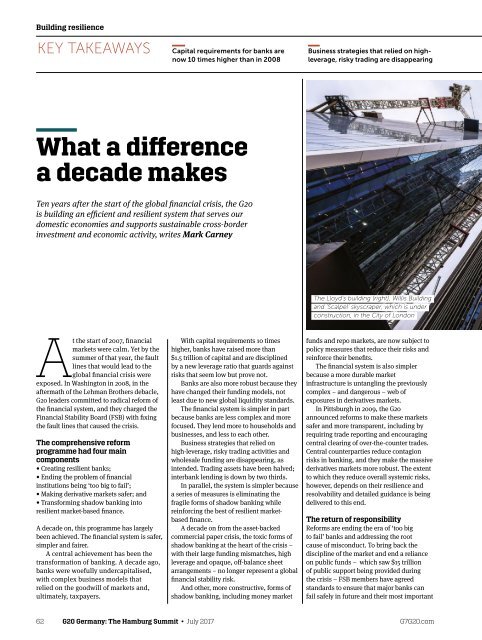G20-Germany-Hamburg-2017
mo.rami@trmg.co.uk
mo.rami@trmg.co.uk
You also want an ePaper? Increase the reach of your titles
YUMPU automatically turns print PDFs into web optimized ePapers that Google loves.
Building resilience<br />
KEY TAKEAWAYS<br />
Capital requirements for banks are<br />
now 10 times higher than in 2008<br />
Business strategies that relied on highleverage,<br />
risky trading are disappearing<br />
What a difference<br />
a decade makes<br />
Ten years after the start of the global financial crisis, the <strong>G20</strong><br />
is building an efficient and resilient system that serves our<br />
domestic economies and supports sustainable cross-border<br />
investment and economic activity, writes Mark Carney<br />
The Lloyd’s building (right), Willis Building<br />
and ‘Scalpel’ skyscraper, which is under<br />
construction, in the City of London<br />
At the start of 2007, financial<br />
markets were calm. Yet by the<br />
summer of that year, the fault<br />
lines that would lead to the<br />
global financial crisis were<br />
exposed. In Washington in 2008, in the<br />
aftermath of the Lehman Brothers debacle,<br />
<strong>G20</strong> leaders committed to radical reform of<br />
the financial system, and they charged the<br />
Financial Stability Board (FSB) with fixing<br />
the fault lines that caused the crisis.<br />
The comprehensive reform<br />
programme had four main<br />
components<br />
• Creating resilient banks;<br />
• Ending the problem of financial<br />
institutions being ‘too big to fail’;<br />
• Making derivative markets safer; and<br />
• Transforming shadow banking into<br />
resilient market-based finance.<br />
A decade on, this programme has largely<br />
been achieved. The financial system is safer,<br />
simpler and fairer.<br />
A central achievement has been the<br />
transformation of banking. A decade ago,<br />
banks were woefully undercapitalised,<br />
with complex business models that<br />
relied on the goodwill of markets and,<br />
ultimately, taxpayers.<br />
With capital requirements 10 times<br />
higher, banks have raised more than<br />
$1.5 trillion of capital and are disciplined<br />
by a new leverage ratio that guards against<br />
risks that seem low but prove not.<br />
Banks are also more robust because they<br />
have changed their funding models, not<br />
least due to new global liquidity standards.<br />
The financial system is simpler in part<br />
because banks are less complex and more<br />
focused. They lend more to households and<br />
businesses, and less to each other.<br />
Business strategies that relied on<br />
high-leverage, risky trading activities and<br />
wholesale funding are disappearing, as<br />
intended. Trading assets have been halved;<br />
interbank lending is down by two thirds.<br />
In parallel, the system is simpler because<br />
a series of measures is eliminating the<br />
fragile forms of shadow banking while<br />
reinforcing the best of resilient marketbased<br />
finance.<br />
A decade on from the asset-backed<br />
commercial paper crisis, the toxic forms of<br />
shadow banking at the heart of the crisis –<br />
with their large funding mismatches, high<br />
leverage and opaque, off-balance sheet<br />
arrangements – no longer represent a global<br />
financial stability risk.<br />
And other, more constructive, forms of<br />
shadow banking, including money market<br />
funds and repo markets, are now subject to<br />
policy measures that reduce their risks and<br />
reinforce their benefits.<br />
The financial system is also simpler<br />
because a more durable market<br />
infrastructure is untangling the previously<br />
complex – and dangerous – web of<br />
exposures in derivatives markets.<br />
In Pittsburgh in 2009, the <strong>G20</strong><br />
announced reforms to make these markets<br />
safer and more transparent, including by<br />
requiring trade reporting and encouraging<br />
central clearing of over-the-counter trades.<br />
Central counterparties reduce contagion<br />
risks in banking, and they make the massive<br />
derivatives markets more robust. The extent<br />
to which they reduce overall systemic risks,<br />
however, depends on their resilience and<br />
resolvability and detailed guidance is being<br />
delivered to this end.<br />
The return of responsibility<br />
Reforms are ending the era of ‘too big<br />
to fail’ banks and addressing the root<br />
cause of misconduct. To bring back the<br />
discipline of the market and end a reliance<br />
on public funds – which saw $15 trillion<br />
of public support being provided during<br />
the crisis – FSB members have agreed<br />
standards to ensure that major banks can<br />
fail safely in future and their most important<br />
62 <strong>G20</strong> <strong>Germany</strong>: The <strong>Hamburg</strong> Summit • July <strong>2017</strong> G7<strong>G20</strong>.com
















